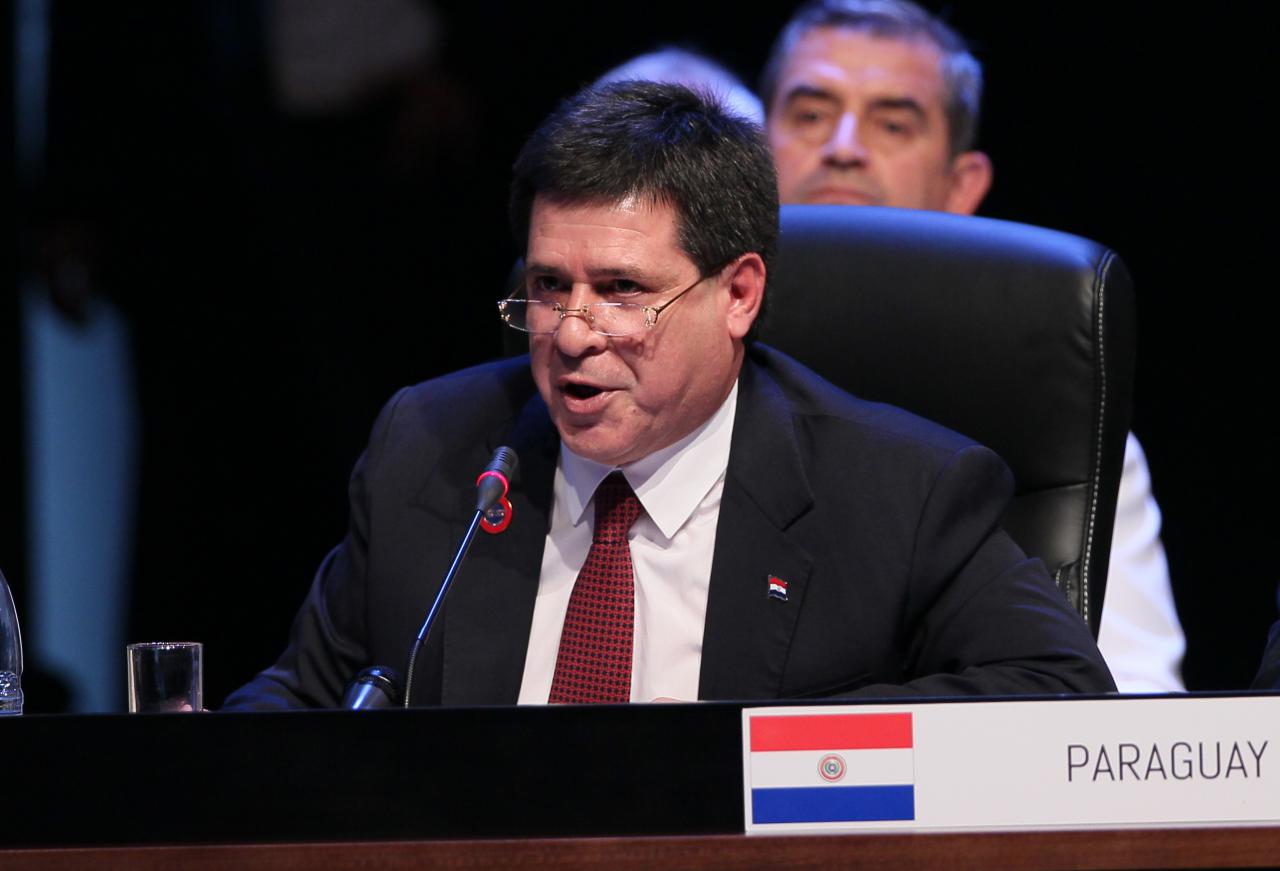
By Peter Tase
On June 17, Senator Blas Llano was elected by his peers as the new leader of the Paraguayan Senate for a term extending from July 1 of this year until June 30, 2015. In his first statement as the president-elect of the Senate, Senator Llano – who represents the Authentic Radical Liberal Party (PLRA), the second largest party in Paraguay – stated, “Last year the PLRA signed the ‘Agreement for Paraguay’ and the main goal of this initiative was to improve and strengthen the national image of Paraguay in the world, increase the level of foreign direct investments in Paraguay, and improve the transparency of our government. It is of vital importance that PLRA [as the largest opposition party] is in a leadership position in one of the most important branches of the Paraguayan government.”
Llano is expected to support a new set of laws that will improve the overall justice system, greater transparency measures to be applied to local government offices, and as make the Paraguayan local government leaders more accountable and responsible with public money. The newly elected leaders of the Senate, in concert with President Horacio Cartes, are planning to make public all pertinent information dealing with major expenses that are incurred by the national government officials and local government leaders such as Mayor Sandra McLeod of Ciudad del Este and other municipal leaders in Paraguay.
Moreover, the current governor of the province is Zacarias’s brother, thus strengthening the clan’s hold over the region. They have genuinely become an oligarchy in an affluent region of Paraguay while the rest of the population copes with high levels of poverty, childhood malnourishment, and lack of education and precarious infrastructure of public schools.
In an historic show of unity, the leading Colorado Party (ANR) and the PLRA have joined forces to elect a candidate of the latter party to lead Congress. In 25 years of Paraguay’s democracy, this joint effort constitutes one of the most important alliances among political factions in Paraguay’s history and a great progress towards strengthening its democratic institutions, rule of law, transparency, accountability and the national economic policies in the country. Llano’s election is an important moment for the nation’s political future and will guarantee Paraguay’s financial and economic stability.
The ANR-PLRA joint actions highlight a new beginning for President Cartes’ aggressive agenda in favor of having an open government, transparency, while championing the fight against corruption. As Cartes often stresses, he insists on “making public everything that is public.”
According to Paraguayan weekly journal Primera Plana, “The candidacy of Sen. Blas Llano as the President-Elect of the National Senate was supported by President Horacio Cartes, as a result of encountering obstacles to find the appropriate candidate from the Colorado Party; Sen. Llano will lead the Senate for one year. Moreover, the agreement with the National Union of Ethical Citizens was instrumental for the election of Sen. Blas Llano.”
 Juan Pío Balbuena, the editor in chief of Primera Plana detailed the election of the two vice-presidents of the Senate, saying “the senators elected Senator Enrique Bacchetta (ANR) as the first Vice President who will replace Sen. Ramón Gómez Verlangieri (PLRA) and Senator Eduardo Petta (of the National Gathering Party – PEN) was elected and he will replace Sen. Víctor Bogado (ANR). Sen. Bacchetta won by a large margin of 28 votes in favor, 16 abstaining votes and one senator was absent. Sen. Petta was elected with 28 votes and had only 17 abstaining votes.”
Juan Pío Balbuena, the editor in chief of Primera Plana detailed the election of the two vice-presidents of the Senate, saying “the senators elected Senator Enrique Bacchetta (ANR) as the first Vice President who will replace Sen. Ramón Gómez Verlangieri (PLRA) and Senator Eduardo Petta (of the National Gathering Party – PEN) was elected and he will replace Sen. Víctor Bogado (ANR). Sen. Bacchetta won by a large margin of 28 votes in favor, 16 abstaining votes and one senator was absent. Sen. Petta was elected with 28 votes and had only 17 abstaining votes.”
The Paraguayan Senate is expected to implement an aggressive agenda in favor of transparency and the war against corruption, while ensuring that the national office of the budget (Contraloría General de la República) will exercise its constitutional obligations and undertake lengthy investigations of the municipal government of Ciudad del Este: the second-largest city in the country, which has been plagued by official corruption and the specter of narco-terrorism. It is also the capital of Alto Parana province, on the banks of the river of the same name.
Citizens in Ciudad del Este and the recently formed Civil Organization “Frente Ciudadano” expect that the National Anti-Corruption Secretariat under the leadership of Minister Maria Soledad Quiñonez Astigarraga will investigate charges of corruption and malfeasance on the part of the mayor of the city, Sandra McLeod and her husband Javier Zacarias: a power-couple that has reigned in the city for over 14 years. Ciudad del Este is the commercial and logistical hub of the landlocked South American country. Minister Quiñonez has led many efforts in the war against corruption, impunity, and is a long-time advocate of government transparency.
Quiñonez and her team at the National Anti-Corruption Secretariat both monitor and coordinate the implementation of government’s policy towards preserving transparency and anti-corruption practices in every public office, government institution and local government entity. It also promotes strategies to prevent and identify corruption scandals led by elected officials as well as report these cases to the attention of appropriate law enforcement authorities.
Over the last 14 years, the international image of Ciudad del Este and Alto Parana has been completely ruined due to charges of impunity, lack of transparency, corruption, cronyism, and abuse of public funds. This occurred while the city and the province have been under the sway of Javier Zacarias, who was followed by his wife Sandra McLeod as mayor for two terms. She has apparently modeled her term in office after her husband’s brazen leadership. Tourism and international conference have shied away from the area because of its reputation. The U.S. government advises its citizens to avoid Ciudad del Este because of its reputation for crime and a lack of safety. Even Peace Corps volunteers are advised to avoid the city and surrounding province.
In the recent election for the leadership of Paraguayan Senate, Zacarias had a candidate running against Llano. However, the candidate lost by a large margin. That may well mark the end of the Zacarias clan’s political influence. This is the first time in Paraguay’s history that the leaders of the two major political parties, including the president, are working in concert to improve government transparency, reduce poverty, increase economic growth, and secure accountability.
With the new and promising alliance of PLRA and ANR, the people of Paraguay hope that transparency will prevail, and light will be shed on official corruption and the trafficking of influence while the clock runs out for the Zacarias clan and its dishonorable public service to a country that shows tremendous promises in industry, mining, agriculture, and energy.




